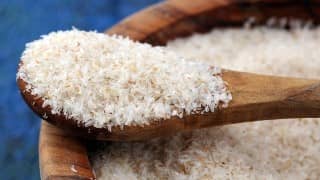
Almost everyone experiences constipation from time to time for various reasons. So what exactly is meant by chronic constipation ?
We’re talking about chronic constipation exactly in the cases where the constipation lasts more than six months. There are people who go to the toilet only once a week and do so for years.
Some people cannot defecate but once every three weeks or even worse, once a month ! These cases are fortunately rare, but still affect the lives of these people.
So if you suffer from long-term constipation, could any natural treatment relieve you ? There is a plant that works wonders in this regard. What is its name ? What are its active ingredients ? How is it used ? This is what we will discover now.
Psyllium Names and Species – Ispaghula
Psyllium seed husk is used worldwide to treat constipation and particularly cases of chronic constipation.
Psyllium seed is also known under the name of « Ispaghula ». The term psyllium comes from a Greek term meaning ‘flea’ referring to its size, shape and whitish color.
Psyllium seed husk is a partially fermented dietary fibre from the plants Plantago psyllium, Plantago indica and Plantago ovata.
Psyllium is a small herbaceous plant belonging to the family Plantaginaceae, which includes no less than 200 different species.
The Main Constituents of PSYLLIUM
The main active ingredient contained in the psyllium seeds are its mucilage. The seeds contain between 10 % to 30 % in its outer shell.
The mucilage of the compound in question is 85% arabinoxylans, polysaccharide or soluble fiber.
The seeds also contain iridoids, sterols, triterpene, glycosides and oils.
Medicinal Uses Of Psyllium and Dosing
By virtue of the large amount of mucilage it contains, the Psyllium mixed with water can significantly increase stool volume and therefore acts as a laxative within 12 hours to 3 days.
It may also be useful in the case of occasional constipation (in case of pregnancy or illness) and even in the case of diarrhea, since it regulates the bolus.
Those suffering from hemorrhoids can also take psylli orally to soften the stools and enable the latter to exit the rectum more easily without causing damage.
There are many psyllium-based products on which are recommended for constipation. The usual dose is at least 3.5 grams two to three times a day, always absorbed with a sufficient amount of liquid (water or juice).
Psyllium Husk Side Effects
If you suffer from an inflammatory disease of the gastrointestinal tract, an intestinal obstruction or ulcers, this natural remedy is not appropriate in your case.
On the other hand, bear in mind that regularly taking psyllium can prevent the absorption of certain minerals (calcium, magnesium) and certain drugs (Check with your pharmacist ).
New Uses of Psyllium – Cholesterol and Diabetes
Recent research has shown that psyllium could lower cholesterol and control diabetes. In some countries, the psyllium is already introduced in cereals that are marketed and recommended for people with hypercholesterolemia and non-insulin-dependent diabetes.
PSYLLIUM Husk + PREBIOTIC + PROBIOTICS To Improve The Bowels
• Fructo-oligosaccharides are prebiotics, that is to say, carbohydrates that our body cannot assimilate but which have the big advantage to serve food to the intestinal flora. Consumption of FOS (fructo-oligosaccharides) helps replenish the intestinal flora. Furthermore, prebiotics enhance the absorption of minerals and benefit the lipid metabolism by reducing blood levels of cholesterol and triglycerides.
• Acidophilic lactobacilli and bifidi are probiotics. These bacterial ‘friends’ of the body help to digest fiber, maintain the balance of intestinal flora and stimulate the immune system.
• As we have seen above, psyllium seed husks recondition the bowel, fighting against constipation and appeasing diarrhea.
A famous British laboratory has developed a dietary supplement that combines these three natural ingredients: Psyllium + probiotics + prebiotics to help people who suffer from constipation, hemorrhoids and hypercholesterolemia.
Author : Alexis ROGER
Natural Remedies For Constipation
Has it been over a week since you’ve gone to the bathroom? Do you have such a bloated stomach that you look 4 months pregnant? Are you tired of going to your doctor only to get more laxatives? Do you have embarassing gas? If so, this may be the most important letter you’ve ever read…
Discover the 7 most common causes of constipation that every woman should know and avoid. Naturopathic doctor reveals 37 Strategies that women can use to rid themselves of constipation, gas, bloating and resulting fatigue.
➤ Constipation Relief For Women (PDF And MP3)
This is not simply some long, laundry list of natural remedies you’ll need to spend hours reading through, debating over which you think will work best for you. This is a specific, well-outlined plan. Depending on what condition your digestive system is currently in, you could achieve relief almost immediately or by the end of the next day.
The GOOD NEWS is you WILL be relieved and feel incredibly better within 24 hours. Many achieve relief after just the initial stage or “Phase 1,” but we know everyone is different. It has been by keeping that important principle in mind that this plan has been carefully created; it is prepared to tackle even the very worst case scenario.